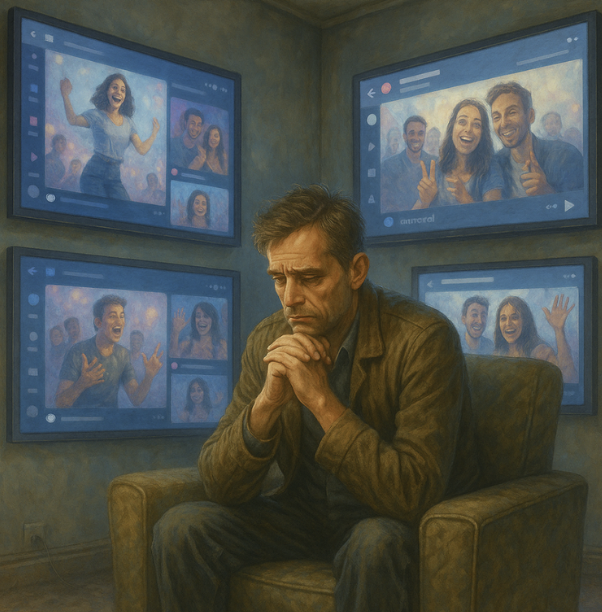

Reflective Commentary (The Modern Wall—Media Saturation in 2025)
Ray Bradbury published Fahrenheit 451 on October 19, 1953—seventy-two years ago, but who’s counting in decades when the man seemed to write in centuries?
Was he a prophet? Or something else; something we don’t quite have a word for anymore? A literary fire-watcher? A midnight radio preacher broadcasting from some analogue dreamscape where books still whispered and walls didn’t speak back?
He didn’t predict the future in gadgets or code. He diagnosed it in the soul. He didn’t draw blueprints; he struck tuning forks.
Bradbury didn’t foresee 2025. He remembered it like a ghost that had already walked these rooms before the screens arrived.
———
To walk, as Leonard Mead once did, alone through silent avenues is now a rare act of subversion. On walls once touched by lamplight, there bloom screens—smart, speaking, ever-watchful. Three were not enough for Mildred; in our own parlours, four is the minimum. The hunger for more, more pixels, more sound, more information, outpaces even Bradbury’s prophetic thread.
In this year, 2025, the kerux of the city square has taken new form: the For You Page, algorithmic, omnivorous, digesting desire, and belching forth content so finely wrought to the palate that appetite itself atrophies. TikTok’s infinite scroll is the new digital pulpit. Here, the “constant diffusion of noise” Bradbury mourned becomes not a stream but a deluge of image chasing image, a parade of thirty-second ghosts striding from one wall to the next. We are no longer merely consuming; we are inhabited, possessed by vaporous presences who know our names, our tastes, our sleepless hours.
The VR room promises a world beyond walls, yet what is this world but a labyrinth of scripted encounters, dazzling yet utterly curated, each corridor narrowing the field of the mind until leisure itself is replaced by frictionless distraction. The silence that once sheltered the liberal mind, in Cicero’s sense, idle only when surrounded, now seems threatening, alien, even dangerous. The productive mind, agitated as a cauldron, is drowned by the quicksilver rhythm of algorithmic feeds, by the perpetual now of clickable futures.
Meanwhile, the books grow heavier. Libraries flicker out, replaced by subscription portals and hidden behind paywalls or cast into the bonfire of “content moderation.” Bans sweep schoolboards and hashtags alike. Reading, always slow and fugitive, is beset not just by disinterest but by outright interdiction; even leisure is bureaucratised, swaddled in notifications, measured in dopamine spikes and ad impressions.
The spiritual inertia Bradbury indicted is now an existential default. We sit, as he wrote, “like the dead,” haunted by the pixel’s cold touch but never deeply warmed. To retreat, to pull the plug, demands not just courage but a kind of willed anachronism, a willingness to be out of step with public time, to choose the uneasy quiet in which genuine thought and freedom might begin again.
Yet, there is hope in resistance not as renunciation but as creation, a rediscovery of the slow pleasures of attention, the gravities of silence, the surprise of solitude. If we are “living through a transition,” as Fawcett claims, we must become pilgrims in our own rooms, turning from walls that speak to the vastness that lies behind them, and, if only for a moment, listening for the faint, liberating hush.
Now, in 2025, looking back at 2014 feels like peering through a fogged window into another century, distant not just in time, but in texture. The world then still hummed analog in places; you could hear the silence between the pings. Phones had weight. Screens flickered, but they didn’t yet breathe.
A decade has passed, and the evolution of technology no longer feels like progress. It feels like climate. It surrounds us, settles into our lungs, coats our thoughts in fine particulate data. There’s no longer a line between being online and simply being.
In 2014, the scroll was novelty. Now, it is the air.
We feed the fire still—only now, we smile while it burns.
The Fire We Feed: Fahrenheit 451 in the Age of Infinite Scroll (Original Essay, 2014)
The risk of a media saturated mind is the loss of autonomy in liberal productive thought. The liberal is one who “searches for an ethically acceptable order of human progress among civic equals without recourse to undue power.”[1] The restraint of thought is the death of liberal learning.
The Problem
Information distributed through media sources has little relevance to the productive mind. In Fahrenheit the "wall" is home to the ghost in the machine.[2] Audible sounds pour forth as if the digital kerux proclaimed a message vested with public authority.[3] The wall; a quasi public square.
Mildred wanted four walls. She already had three. Walls; expensive to own. A perennial presence in the house. Media. Information. Propaganda. A constant diffusion of noise. An information gestapo. A tool of the state. Bradbury used terms as “on one wall” and “in the other wall” noting the constant onslaught of media: “a minute later” then “two minutes more” another barrage of content.[4]
A vapid flow of information has little relevance to the productive mind. In Fahrenheit a colorful word construct describes the “abrupt”[5] cranial assault with picturesque views: a person drank orange juice with an animated shift to the X ray of the beverage on its journey to stomach; a rocket flight into the clouds plunging into a lime-green sea; and White Cartoon Clowns chopping off each others limbs as jet cars appear wildly circling an arena.
A culture in decline no longer requires the availability of literature. Leonard Mead had not written in years since “magazines and books didn’t sell anymore. Everything went on in the tomblike houses at night now…”[6] The data being ingested became an intellectual sarcophagus lit only by programmed thought not designed to nurture the liberal mind. The house dwellers “sat like the dead, the gray or multicolored lights touching their faces, but never really touching them.”[7] The mesmerizing lights shown on the dead but did not touch the soul.
The Solution
The productive mind actively removes the mind-numbing invasion of a media-driven wasteland. In Fahrenheit“Montag reached inside the parlor wall and pulled the main switch. The images drained away…”[8] The despicable fountainhead simply ceased. The switch served as a guillotine severing the mind from the media. The rabbet penetrated the ghastly media-driven tomb bringing to a halt the proselytizing of the state.
Productive thought requires silence. Silence begets leisure. Leisure passion. The productive mind can be alone in the world but free. The noise of the daemon haunts the quiet place of the mind. The mind agitated. Agitation turns as a cauldron of great discomfort. Cicero was “never less idle than when he was by himself.”[9] In The Pedestrian gray phantoms “seemed to manifest upon inner room walls where a curtain was still undrawn against the night, or there were whisperings and murmurs where a window in a tomblike building was still open.”[10] In contrast, the pedestrian walked “through the silences, that was what Mr. Leonard Mead most dearly loved to do.”[11] As he strolled the quiet streets he paused “deciding which way to go, but it really made no difference; he was alone in the world.”[12]
Conclusion
Liberal learning is embodied by those who are “living through a transition.”[13] To learn in an environment free of restraint from external bodies is the source of true intellectual freedom and boundless opportunity[1] .
References
[1] Edmond Fawcett, Liberalism the Life of an Idea (Princeton, NJ: Princeton University Press, 2014), xv.
[2] This author interprets “wall” much like the large screen television the size of a partition in a room.
[3] This author’s assumption is that the a propo term for the 2050s is “digital” although technology may have advanced far beyond the digital by this point in time.
[4] Ray Bradbury, Fahrenheit 451: A Novel, Reissue ed. (New York: Simon & Schuster, 2013), 90.
[5] Ibid. The term “abruptly” describes the roller coaster feel of the text.
[6] Ray Bradbury, “The Pedestrian” (short story, 1951), 1.
[7] Ibid., 2.
[8] Bradbury, Fahrenheit, 90.
[9] James V. Schall, The Life of the Mind: On the Joys and Travails of Thinking, 2 ed. (Wilmington, DE: Intercollegiate Studies Institute, 2008), 96.
[10] Bradbury, Pedestrian, 1.
[11] Ibid.
[12] Ibid.
[13] Fawcett, Liberalism, 394.
Bibliography
Bradbury, Ray. Fahrenheit 451: A Novel. Reissue edition. New York: Simon & Schuster, 2013.
Bradbury, Ray. "The Pedestrian." Short story, 1951.
Fawcett, Edmond. Liberalism: The Life of an Idea. Princeton, NJ: Princeton University Press, 2014.
Schall, James V. The Life of the Mind: On the Joys and Travails of Thinking. 2nd ed. Wilmington, DE: Intercollegiate Studies Institute, 2008.

